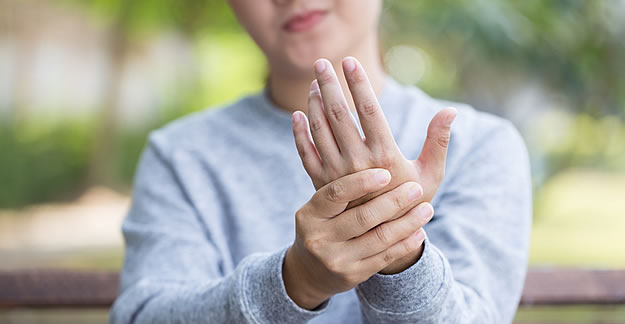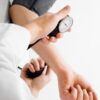Patricia Braden liked hiking for hours in the woods and walking her Corgi-mix dog near her home in Greensboro, NC. The retired clinical psychologist also enjoyed long conversations with friends, family, and her clients.
But those days are over because of peripheral neuropathy and the side effects — such as problems with balance and concentration — of drugs used to treat it.
She is not alone. An estimated 20 million people in the US have some form of peripheral neuropathy, according to the National Institute of Neurological Disorders. The condition results from damage to the peripheral nervous system, the nerves running from the brain and spinal cord to the rest of the body.
Symptoms are numbness and a prickling or tingling sensation in your feet or hands, which can spread to the legs and arms. Other signs include sharp, throbbing, freezing or burning pain, extreme sensitivity to touch, and a lack of coordination that can lead to falls.
Browse This Article
2 Kinds of Drugs Used to Treat Neuropathy
The drugs to treat neuropathy fall into 2 classifications: antidepressants and anti-seizure medications, though it is not totally clear why they work for nerve pain. Many patients also experience a host of sometimes debilitating side effects from the drugs. The good news is that there are several alternative treatments and therapies that many patients have used to find relief that can minimize the use of medications.
David Cornblath, MD, professor of neurology at Johns Hopkins Hospital in Baltimore and a specialist in peripheral neuropathy, said the 3 main drugs approved for treating diabetic neuropathy — the most common type of neuropathy — “all have positives and negatives.”
He said the anti-seizure medication Neurontin (gabapentin) has the fewest side effects. Lyrica (pregabalin, another anti-seizure medication) comes next, and the antidepressant Cymbalta (duloxetine, a serotonin and norepinephrine reuptake inhibitor) has the most.
Doctors prescribe those same drugs for other kinds of neuropathy, such as the category of idiopathic neuropathy (meaning no known cause) into which Braden and many others fall. They are also used for fibromyalgia, another nervous system disorder with some of the same symptoms as neuropathy.
According to Cornblath, “Many start with gabapentin. It’s well-tolerated. But relief rarely occurs until people get to 1,800 milligrams a day,” he said. “Many are underdosed.”
However, “many patients find the side effects of increased dosages intolerable,” said Marlene Dodinval, executive director of The Foundation for Peripheral Neuropathy, a nonprofit in Buffalo Grove, IL.
Common side effects of the 3 drugs include fatigue, nausea, drowsiness and confusion, and weight gain or loss, in addition to side effects specific to each drug and the possibility of drug interactions. But they can be more extreme: The FDA requires manufacturers of antiepileptic drugs to carry warnings about increased risks of suicidal thoughts and behaviors. Antidepressants may also increase suicidality, especially for children, young adults and teenagers. In trials, patients who took an antiepileptic drug had almost twice the risk of suicidality as those who did not.
Falls, Forgetfulness and Other Side Effects
The 83-year-old Braden has not been immune from side effects. “I’ve fallen 3 dozen times in the last 10 years.” To help alleviate the sharp pain and the sensation that she likened to wearing iron shoes, her doctor put her on a high dose of Neurontin, which made her forget words in the middle of a thought, as did the Cymbalta that she takes.
“The thing I struggle with is, I don’t know if the benefit is worth the side effects,” she said.
Others have a similar dilemma. Valerie Lloyd, a retired government employee, could take more Neurontin for her painful chemotherapy-induced peripheral neuropathy, but is deterred by the side effects. “It’s in my feet, hands, and sometimes lips,” she said. “I feel OK in the morning, and that’s when I shop and garden. By about 6 in the evening, I get a burning, electrical feeling, the pins and needles.”
Lloyd started on three 300mg capsules of Neurontin a day, working up to 4 and 5 capsules daily.
“My doctor said I could take 6, but the thought of taking more turns me off. I didn’t like the way it made my feet feel swollen and fat,” she said. “I stopped taking it and it was a different kind of pain, so I went back” on Neurontin.
Alternatives to Medication for Nerve Pain
However, medications aren’t the only way to treat nerve pain. Lloyd, a 65-year-old Alexandria, VA, resident, said she has found some relief in a foot cream whose main ingredient is capsaicin, a substance found in hot peppers, and thought to reduce chronic neuropathic pain by making nerves less sensitive to pain messages.
Water aerobics also help her “feel a little better about my strength and definitely helps my state of mind.”
This approach is consistent with a slew of mind and body therapies and other complementary and integrative therapies, according to The Foundation for Peripheral Neuropathy.
Carolyn Hicks, a psychologist and landscape painter in Northampton, MA, found relief in one such therapy — acupuncture — when the 70-year-old got peripheral neuropathy after chemotherapy for breast cancer. “I found that it was very helpful having more energy and balance and also in mitigating symptoms associated with neuropathy such as numbness and tingling, aches and sensitivity to the cold, and burning in fingers and toes,” she wrote in an email.
Elayne Goldstein, a 68-year-old retired teacher from Philadelphia, developed numbness and pain “like a knife was slicing my foot” after a knee replacement 2 years ago. She was on a high dose of Neurontin but weaned herself down to 300mg at night “because I didn’t want to be on medication.”
At night she wears a magnetic wrap “because something compressing it seems to help.” She also teaches yoga dance to seniors. “When I’m moving, I don’t feel any pain.”
Jennifer Buttaccio, an occupational therapist in Chicago, advises patients on better managing daily activities, strengthening exercises, and pain management strategies to find relief.
“I can recommend a patient talk to their doctor about having their vitamin B12 and magnesium levels checked,” she said. “I can also tell them to see if the doctor will provide them with a script for physical therapy to see if there are more specific modalities, strengthening, and pain management strategies that can be implemented.”
First published: Aug 3, 2017







